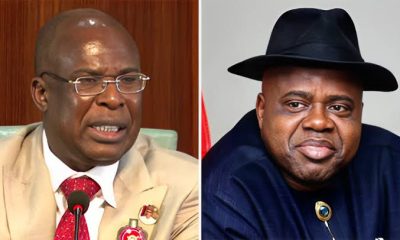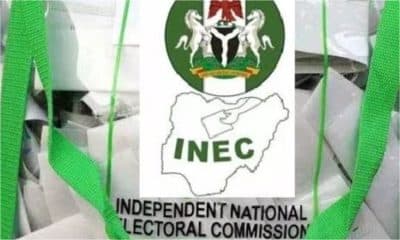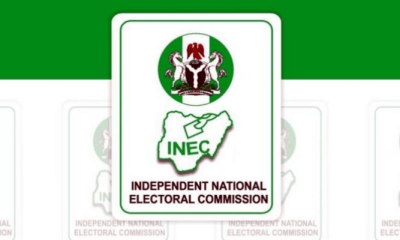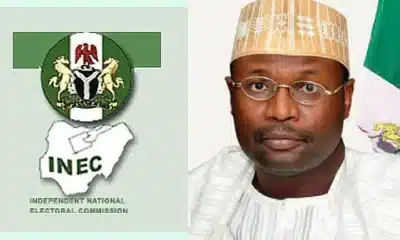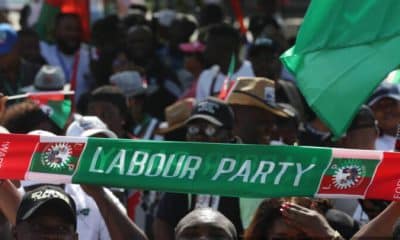Nigeria News
See The Biggest Political Gainers And Losers Of The 2019 Presidential And National Assembly Elections.
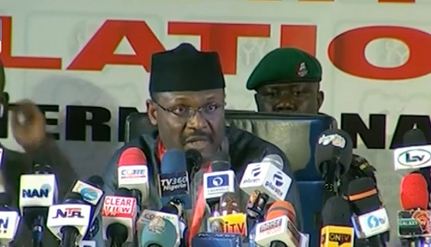
The much anticipated presidential and National Assembly elections in Nigeria fixed for Saturday, February 23, 2019 have come and gone.
No doubt about the fact that winners and losers have emerged by now.
The Independent National Electoral Commission (INEC), has declared the candidate of the All Progressives Congress (APC) and incumbent President Muhammadu Buhari winner of last Saturday’s presidential election.
The INEC chairman, Professor Mahmood Yakubu, who was the chief collation officer for the poll, at the end of the collation exercise in Abuja on Wednesday morning, said President Buhari polled a total of 15,191,847 to defeat the candidate of the Peoples Democratic Party (PDP), former Vice President Atiku Abubakar and 71 others.
According to him, Atiku garnered 11,262,978 votes to place second in the keenly contested poll.
The just-concluded presidential poll drew lots of attention from within and outside the country. So many projections and analyses were made about the all-important poll as a result of its uniqueness and the importance attached to its success.
However, the many successes and challenges recorded in the electioneering process have no doubt provided a lesson for future elections in Nigeria and other countries around the world. Apart from that, moves by some politicians to either retain their political seats or move to higher seats particularly in the Senate, suffered a setback at the just concluded elections as only a few of them made it while the majority of them lost their bids.
Most shocking has been the collapse of some powerful “godfathers”, who use money and influence to win support for themselves and to sponsor their preferred candidates in elections. Defectors, those who switched sides between the two main parties ahead of the polls, have also fared badly.
Here some of the big losers and winners from the polls:
LOSERS
Atiku Abubakar
The 72-year-old politician now has the unenviable record of losing every presidential election he’s contested, for the fifth time of asking.
Atiku first ran for President on the platform of the Social Democratic Party (SDP) in 1992 alongside Chief MKO Abiola and served as Vice President to then President Olusegun Obasanjo from 1999 to 2007. Since departing Aso Rock in 2007, Atiku has nursed a burning ambition to return as Nigeria’s President, while splurging wads of cash at every attempt.
He has promised to upturn his 2019 loss to Buhari at the courts, describing the vote as a sham and an emasculation of democracy.
Godswill Akpabio
Godswill Akpabio is a godfather in the South-South, but the Senate seat has eluded him.
A former Governor of Nigeria’s South-South Akwa Ibom State and Senate Minority leader of the current 8th Senate, Godswill Akpabio went into the senatorial election in his State with a fearsome reputation for brinkmanship and years of experience in the nation’s political scene to boot.
When he made the switch from the PDP to the APC on August 8, 2018, the governing APC made a big deal of it.
Essien Udim results, that will determine the fate of Senator Godswill Akpabio just be turninoniown ….
Mike Igini be calling for The results, but the results be doing a Kepa on him 😄😄😄 pic.twitter.com/hhXrUyqQFP— Akwa Ibom Hypeman (@romeocza) February 25, 2019
However, Akpabio’s “uncommon defection” (as he and the APC termed it) couldn’t stop him from losing the Akwa-Ibom North-West senatorial seat to PDP candidate Chris Ekpenyong who was backed by Akpabio’s successor and incumbent Governor Udom Emmanuel.
Emmanuel, a former handpicked godson of Akpabio’s, is now sworn enemy of the “uncommon defector”.
Like Atiku, Akpabio has told everyone who cares to listen that his election loss is only a temporary setback which he will upturn through the legal process.
Abubakar Bukola Saraki
Saraki won’t be returning to the Senate in the biggest shocker from the elections.
A Governor of the north-central state of Kwara from 2003 to 2011 and a Senator from 2011 to this day, Senate President Bukola Saraki won’t be returning to the hallowed Senate chamber in 2019 after losing the Kwara Central senatorial seat to lesser-known Ibrahim Oloriegbe of the All Progressives Congress (APC).
.@bukolasaraki
-Senate Leader represents Kwara Central since 2011
-Leader of the PDP
-Former governor of Kwara from 2003 to 2011 under the platform PDP
-Was re-elected in 2015 under APC until moving back to PDP in 2018
-Lost his seat to Ibrahim Oloriegbe of APC#OpenNASS pic.twitter.com/cc2zxWz4KS— Shine Your Eye! (@NGShineYourEye) February 28, 2019
Saraki was crowned Senate President on June 9, 2015, against the wishes of his then political party, APC, and spent a huge chunk of his reign battling the APC hierarchy and fending off accusations bordering on corruption, money laundering and false declaration of assets.
Tired of what he perceived as political persecution from the presidency and the governing APC, Saraki formally defected to the People’s Democratic Party (PDP) on August 1, 2018 to join ranks with the party’s presidential candidate Atiku Abubakar.
A smart politician with bags of tricks to boot, Saraki successfully evaded several impeachment plots from the APC and was exonerated by the Supreme Court on corruption charges.
But his loss of the Kwara Central senatorial seat has to be the biggest upset from the Feb 23 polls, and a culmination of the APC’s carefully orchestrated plots to eventually unseat him.
Rabiu Musa Kwankwaso
Senator Rabiu Kwankwaso’s outsized persona in Kano wasn’t enough for Atiku.
A grassroots politician with a cult following in Nigeria’s Northwest State of Kano, Senator Kwankwaso was supposed to be the man who delivered his State to Atiku. He literally had one job before Feb 23.
However, Kwankwaso’s eponymous, feral and manic Kwankwasiyya movement which turned up–complete with those symbolic and ubiquitous red caps– for Atiku during the PDP’s presidential campaign stop in the Northwest, couldn’t stop Buhari from railroading Kano and carting away 1.4million votes.
Olusegun Obasanjo
Obasanjo hosts a powerful Atiku delegation in Abeokuta in 2018. His support wasn’t enough for Atiku.
Nigeria’s former President Olusegun Obasanjo denounced President Muhammadu Buhari in January of 2018 and warned the president against seeking a second term in office.
A prolific letter writer, Obasanjo’s invective laden public address to Buhari went viral, caught fire and was immediately weaponized against the sitting president.
@PhilipObin @OfficialAPCNg @NGRPresident @MBuhari @NGRSenate @HouseNGR @officialEFCC @ICPC_PE Please take note of this development and all hands should be on deck.
You see this country? Nobody flies out now, not so fast, #OlusegunObasanjo https://t.co/wxyvvsW3jY
— Unyime Edet (@kenwills01) February 28, 2019
Making Atiku president became Obasanjo’s pet project. However, unlike his previous letter to then sitting President Goodluck Jonathan, Obasanjo’s attack of Buhari left no dent in the final vote tally. Worse, Obasanjo lost his Abeokuta polling unit to Buhari’s APC on voting day. Obasanjo’s so-called third force also never materialized before the presidential election. A very big loser if ever there was one.
Abiola Ajimobi
Governor Abiola Ajimobi of Oyo State was served humble pies in senate race
Oyo State Governor Abiola Ajimobi regards himself as the “constituted authority” of the Southwest State, a moniker he earned after a public spat with students who were protesting the shutdown of their institution, in January of 2017.
Ajimobi completes his second four-year term as governor in May of 2019 and was looking forward to a retirement plan in Nigeria’s parliament.
However, Ajimobi lost the Oyo South senatorial seat to a former Commissioner for Commerce and Cooperatives, Kola Balogun, of the PDP.
“If I lose the ticket and the party was able to gain, then it is nothing to feel sad about. APC has done well but we can always do better. If we won two out of the three Senatorial seats and we picked nine out of 14 federal constituency seats, then we should congratulate ourselves”, Ajimobi said afterwards, preferring to see his glass as half full.
Olubankole Wellington
Olubankole Wellington (Banky W) of the Modern Democratic Party (MDP) at a debate for candidates contesting for the Eti-Osa constituency seat in the House of Representatives.
R&B singer, Olubankole Wellington, better known by his stage name Banky W, vied for a federal House of Representatives seat with characteristic razzmatazz, vigour, polish, poise, eloquence, elegance, bars and wit.
He was a force of nature on the campaign trail and contributed to taking his Modern Democratic Party (MDP) to national prominence.
However, the 37-year-old singer lost his legislative bid to the establishment-backed Babajide Obanikoro of the governing APC and only won two polling units for his efforts.
He posted the following on social media after the poll: “I hope we look back at what we accomplished in just three months, and it shows us what we can do with the next four years. I hope we realise that winning some areas in Eti-Osa… is proof that we can do this anywhere.”
Shehu Sani
Senator Shehu Sani lost his war with El-Rufai.
For most of his four years as a federal senator, Shehu Sani engaged Kaduna Governor Nasir El-Rufai in verbal and supremacy battles. As the battle between both men raged, Sani dumped the APC for the lesser known People’s Redemption Party (PRP), while hoping to retain his senate seat from his new platform.
A human rights activist before his recent foray into politics, Sani lost his senate election to the El-Rufai backed Uba Sani of the APC. While Uba Sani polled 355,242 votes, Shehu Sani polled 70,613 votes to come a distant third in the race.
WINNERS
President Muhammadu Buhari
Despite alleged gang-up of some ex-generals and numerous endorsements from some socio-political organizations in the country, President Muhammadu Buhari was able to scale through and win for a second term in office.
In 2015, President Buhari won with 15,424,921 votes or 53.95 per cent of the total valid votes cast, but in 2019, he won the presidential election polling 15,191,847 votes to defeat his closest rival, Alhaji Atiku Abubakar, the candidate of the PDP, who scored 11,262,978 votes.
In his acceptance speech after he was declared the winner, President Buhari said the new administration will intensify its efforts on security, restructuring the economy and fighting corruption.
According to him, “We have laid down the foundation and we are committed to seeing matters to the end. We will strive to strengthen our unity and inclusiveness so that no section or group will feel left behind or left out.” However, some analysts posited that the duo of President Buhari and Atiku have three things in common:
Bola Tinubu
APC leader, Bola Tinubu was key for Buhari againThe 66-year-old godfather of Lagos and APC politics has a knack for picking and choosing his battles and winning most of them.President Buhari’s re-election bid looked somewhat unsteady and shaky until Tinubu made peace with the president and took the co-driver’s seat in the president’s re-election campaign train.Tinubu not only delivered a chunk of the Southwest States in his base to Buhari, he also made himself a foot soldier who campaigned alongside the president across the nation’s 36 states.
Aishatu Binani
Aishatu Binani is the only female senator from the north (Youtube cropping) Aishatu Binani is the only female senator from the north (Youtube cropping)47-year-old Binani now holds the record of the only female from the north of Nigeria to be elected into the upper legislative chamber.
Binani’s victory is still seen as a shocker because even though she ran on the platform of the governing APC, she hails from Adamawa State, the birthplace of PDP candidate Atiku Abubakar.
The PDP won Adamawa in the presidential election but the young Binani defied all odds and dispatched all her male rivals in the contest to win the Adamawa central seat. No small feat in a country with one of the lowest rates of female participation in parliament, according to the United Nations.
Ibrahim Oloriegbe
Ibrahim Oloriegbe defeated Saraki in a huge upset Oloriegbe went into the battle for the Kwara central senatorial seat with Senate President Bukola Saraki, as the clear underdog. He wasn’t supposed to win the seat in a senatorial zone where the Saraki hegemony has become something of a stranglehold. However, thanks to the Otoge! (Enough is enough) battle cry from the APC and its faithful in the state, Oloriegbe defeated Saraki in all four local governments in the senatorial zone, polling 123,808 votes to Saraki’s 68,994.No one else claimed a bigger scalp in the parliamentary elections.
Dino Melaye
Senator Dino Melaye returns to the senate against all odds
Senator Dino Melaye who represents Kogi West in the upper legislative chamber, went into the general elections battered, bruised and traumatized after getting on the wrong side of the APC. He was on trial for a slew of criminal charges and pulled up one stunt after another as law enforcement hounded and encircled him for alleged culpable homicide.
Melaye dropped singles and dance videos all year round, dumped the APC for the PDP, riled his opponents with dramatic performances and famously jumped off a moving police van for his troubles.In spite of it all, Melaye defeated Smart Adeyemi of the APC to retain his senatorial seat. He has been thanking God in social media posts, since his victory.
And just as well.
Felix Nicholas
Strategic positioning did it for Felix Nicholas.
Mr. Nicholas wasn’t even in the conversation when folks went on and on about the ‘3rd force’ ahead of the presidential election.
But the presidential candidate of the Peoples Coalition Party (PCP) polled a distant third behind Buhari and Atiku, with a vote total of 110,196—more than the combined votes from the quartet of Kingsley Moghalu of the YPP, Omoyele Sowore of the AAC, Fela Durotoye of the ANN and Obiageli Ezekwesili of the ACPN.
Pundits say Nicholas and the PCP benefited from having a logo that resembles the PDP’s and sharing party initials that arrive before the PDP’s on the alphabetical rung of political parties on the ballot papers. Strategic positioning, did we hear you say?
Nicholas is a winner here, however you look at it.
Kola Balogun
Kola Balogun defeated Ajimobi
The one reason why Governor Abiola Ajimobi won’t be going to the senate to swell the ranks of former governors who turn parliament into a retirement home, is because of this man.Balogun essentially pulled an upset in an APC stronghold, defeated an incumbent governor and helped tilt the scales the PDP’s way in the presidential election.
Winner every day of the week and twice on Sundays.
Yakubu Dogara
Yakubu Dogara makes a return to the House as a floor member (NASS media)The Speaker of the House of Representatives wasn’t any bookmaker’s favorite to retain his Bauchi House of Representatives seat after defecting to the PDP.Bauchi predominantly votes APC as well.
However, Dogara, from the Christian minority in a predominantly Muslim State, will return to represent the Bogoro/Dass/Tafawa Balewa constituency in the 9th senate—a constituency he has been representing since 2007.
He certainly won’t retain the Speakership position however, because the governing APC would form the majority in parliament and handpick a Speaker from within its ranks. But Dogara returning to the House in the first place, is no mean feat in the face of all the odds stacked against him before the vote.

